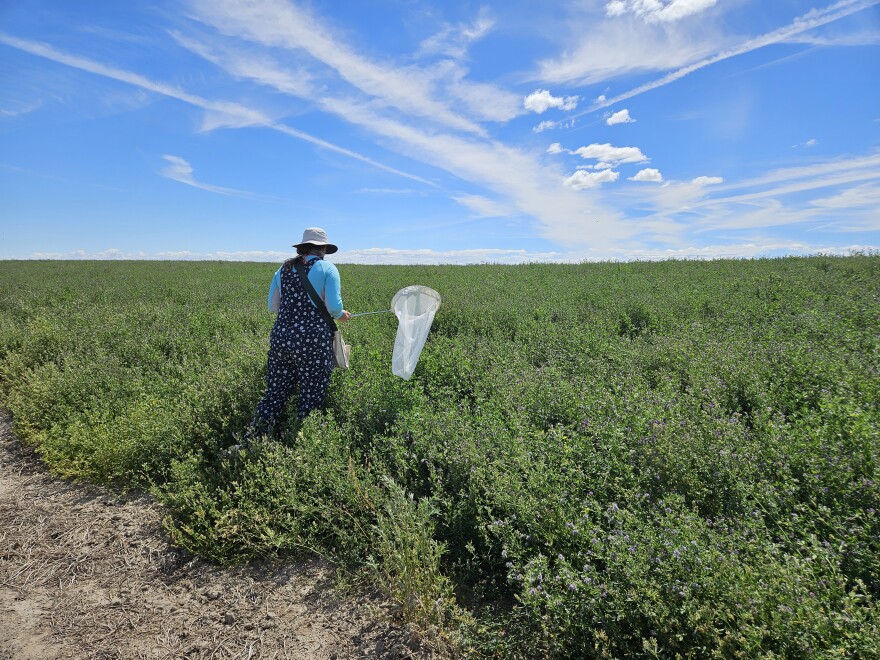Michelle Kirchner dreamed of studying bees in the Beehive State.
That’s why, after defending her doctorate in entomology and biology at North Carolina State University, she immediately packed up and moved across the country to start her role with the U.S. Department of Agriculture’s research service at the Bee Biology and Systematics Laboratory in Logan to study how to help farmers control pests while protecting pollinating bees.
What she didn’t know then was that within a year, she would be one of thousands of probationary federal workers fired from their dream jobs. The firings are the first step in President Trump’s and the newly-created Department of Government Efficiency’s effort to shrink what they see as an oversized government, leaving many scientists jobless and their research unfinished.

Now, she is left searching for work with a tarnished record in a highly specialized field.
“It still hasn’t really sunk in because it was so sudden, and it kind of came out of nowhere,” Kirchner said. “This was my dream position and now I’m sitting here in Logan, Utah, for no reason.”
Her research worked to help alfalfa farmers find the balance between controlling pests and protecting beneficial insects like bumblebees. This is crucial for keeping alfalfa crops healthy, she added, as it’s grown for hay to feed livestock, supporting the dairy industry. Pollinators, she said, are the backbone of the agriculture industry.
Now, as far as she knows, the project is “dead in the water.” The project’s grant money, which could only be used to hire someone to lead the research, was tied to her role. After her firing and a hiring freeze, there’s no one left to continue the work, and the funding is only available for three more years. Over the 10-month period she worked there, Kirchner submitted three peer-reviewed manuscripts for publication.
“This research is really important,” Kirchner said, “and it is helping to create more sustainable agriculture. Everyone has to eat.”
USDA backs decision

When Kirchner received her termination letter from White House human resources in mid-February, she had received nothing but “glowing” reviews from her supervisor. So it was even more surprising to her that the reason for her firing, as stated in the letter written by someone she said had no way of assessing her work, was “poor performance.”
“That is what it will say in my record of working with the federal government,” Kirchner said, “that my continued employment was no longer in the public interest based on my performance. That is a blatant lie.”
Leading up to her termination, Kirchner and other scientists she worked with received emails informing them they were still probationary employees — a common status for new federal workers, lasting anywhere from one to three years. After that, she heard rumors that all probationary employees would be fired soon.
The next day, she received her termination notice, telling her she was fired as of 5 p.m. that day. After that, she said, she was required to do off-boarding tasks without pay.
Now, she added, all those who are in similar specialized fields to her are back on the job market at the same time.
“Finding jobs for scientists right now,” she said, “is not as easy as going to the job tree and picking a job.”
A USDA spokesperson told Utah Public Radio that U.S. Secretary of Agriculture Brooke Rollins fully supports the president's directive to “optimize government operations, eliminate inefficiencies, and strengthen USDA’s ability to better serve American farmers, ranchers, loggers and the agricultural community.”
“We have a solemn responsibility to be good stewards of Americans’ hard-earned taxpayer dollars,” the spokesperson wrote, “and to ensure that every dollar is being spent as effectively as possible to serve the people.”
‘Suppressing creative thought’

The USDA’s Bee Biology and Systematics Laboratory in Logan has lost other key members of its research team.
In January, Kirchner and her colleague Nevin Cullen won a $25,000 grant through the Alfalfa Pollinator Research Initiative to further research into protecting pollinators and alfalfa crops. Their proposal was chosen by growers themselves.
Cullen, who defended his doctorate in 2023 and also saw his grant-funded research position as a dream come true, was hired through the lab with funding from the U.S. Fish and Wildlife Service. While the money is still available to the lab, much like Kirchner’s situation, it’s now just sitting idle, doing nothing, said Cullen, who also lost his job amid the sweeping federal cuts.
Rumors began to spread earlier this year that funding might be slashed, he said. This, he said, was the “worst-case scenario.”
“It felt really horrible,” Cullen said. “My supervisor actually came to my house to tell me and it was really painful. It still hurts to think about.”
He said there’s a small chance to salvage what he’s done of his research so far, but the money already spent on the project may be wasted. As he prepares to move to Oregon for a new position he was lucky enough to find, he said he is trying his hardest to continue the work in the “margins of his life.” He said the Logan lab is one of the only ones pushing this kind of research.
“A huge amount of innovation will be lost,” Cullen said. “Thinking about the broader cuts to scientific funding, I think this is probably a big step in America not being a research leader in the world. This is suppressing creative thought and innovation, really.”
On Wednesday, an independent federal board ordered the USDA to temporarily reinstate nearly 6,000 probationary workers, National Public Radio reported. Kirchner and Cullen had not received notices about being reinstated as of Wednesday afternoon.



